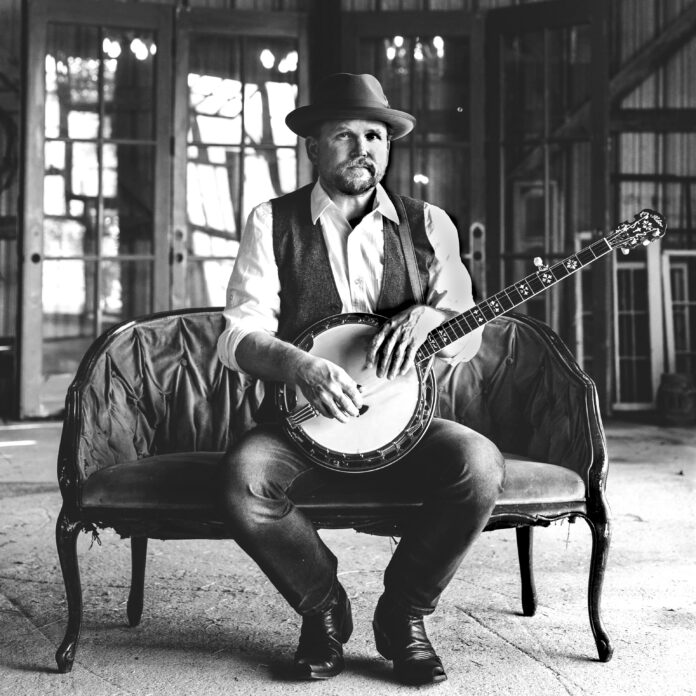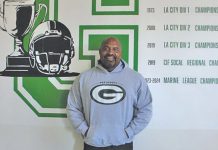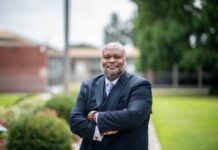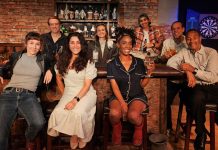
Fourteen-time Grammy winner Ron Block is the banjo player in bluegrass giant Alison Krauss’ band Union Station. As a result, he’s one of the most in-demand banjo players in modern bluegrass, and he’s also a successful solo musician. On top of all that, he spent some of his childhood living in Gardena so we decided to have a chat with him. When did you start playing banjo, and when did it get serious? I was about 12 or 13. My dad used to own a music store in Lawndale called Hogan’s House of Music, just off the 405 freeway on Hawthorne Boulevard. When I was little till about 1970, we lived in Gardena. I was born in ‘64. Dad worked at the store, and then right about 1971, maybe 1970, the owner of the store passed away. Dad ended up being half owner, and then he bought it out and became the full owner of the music store. So, I grew up hearing music. By the time I was 10 years old, I wanted a guitar. Dad got me a guitar, and I was just sort of strumming along on things. Then I heard bluegrass when I was about 12 years old, on TV, and I wanted a banjo. So when I was about 13, dad got me a banjo. Just a real cheap model, and I went to town on it. He says now, ‘I got you a banjo at 13 and you didn’t come out of your room until you were 21,’ which is kinda true. I just learned from a couple of books. I listened to bluegrass albums, and then I found out about the festival scene, in California even. There was one in NorCo, one up in Grass Valley that still goes on. Chino, La Jolla, there were lots of different festivals in California at that time. So by the time I was about 15 or 16, I had got a car, started working for my dad’s store, and then on the weekend I’d go either to jamming at somebody’s house, rehearsal with bands I was in, or I was off at a festival playing music. California is not necessarily known for bluegrass – was it hard to find likeminded souls here? I was working for my dad, so I had a part time job working about 30 hours per week, and then I was in a band all through those teenage years from 15 to 21, and the bands I was in would make good money on the weekends. So I was making decent money, but it was because I had a part time job as well. Once I turned 21, I went to Texas to go to a college that had bluegrass courses, and recording, and all kinds of stuff like that. So I quit my job with dad, quit the bands I was in, and went out there. When I came back to California about a year later, and I was trying to make a living playing music, it was not easy out there to do that. The place to make a living playing music if you’re going to try to do that at all is out east. Especially this kind of music. How did you connect with Alison Krauss? I started out playing in a local band and we traveled up and down California. Through that, I met other people and we formed a regional band so I quit the local band. Then you travel regionally. We went as far as even Branson, Missouri, and Nashville. We travelled over a wide region, and then through that traveling you meet other bands that are playing at festivals. Back then, I was just a dumb kid… 22, 23 years old. If I saw a band and they were great players and singers, and they had a great set, I would walk up to them and go, ‘You guys sounded amazing.’ I would tell them. That’s kind of how it works. In bluegrass, back then, there was this really informal networking. You weren’t going, ‘I’ll see if I can get a job with this person.’ You were just going, ‘Hey, you’re an awesome player, do you wanna jam later?’ So it was more about playing with different people. Through that, I began to meet people like Alison and other people who would later be in her band. You just meet people through playing at festivals and, sometimes, if they like your playing and it stands out somehow, lots of times they’ll have you come play on albums or be in their band even. That’s how it happened. I hate to use the word organic, but it was a natural outgrowth of going to festivals. Do you enjoy coming back to SoCal with her? I do. My dad, my stepmom and a bunch of relatives live all scattered all up and down California. So yeah, I love coming here and getting to see everybody and playing for the folks. Do you remember anything about your early years in Gardena, even though you left when you were six? Just flash images of our neighborhood. I don’t remember where it was, but images of the neighborhood more than anything. We moved when I was 6. I moved up north with my mom when I was about 7. What do you have planned for next year? I’m finishing up another album. I have a lot of solo albums as well as a lot of albums I’ve done with Alison. Those are on my website, ronblock.com. I’m finishing up another album. I do teaching workshops, banjo and guitar workshops on my website. I’ve been doing that. Then next year I’ll be doing some more dates in the UK and Ireland too, with Damien O’Kane. I’ve played since 2014 with Damien, an Irish tenor banjo player. So he plays four strings with a flat pick and I play five strings with finger picks. So we blend — I call it bluegrass and Irish in a blender. We travel around to the folk festivals in the different places there, and there are lots of bluegrass bands at those folk festivals too.
For more information, go to ronblock.com

















